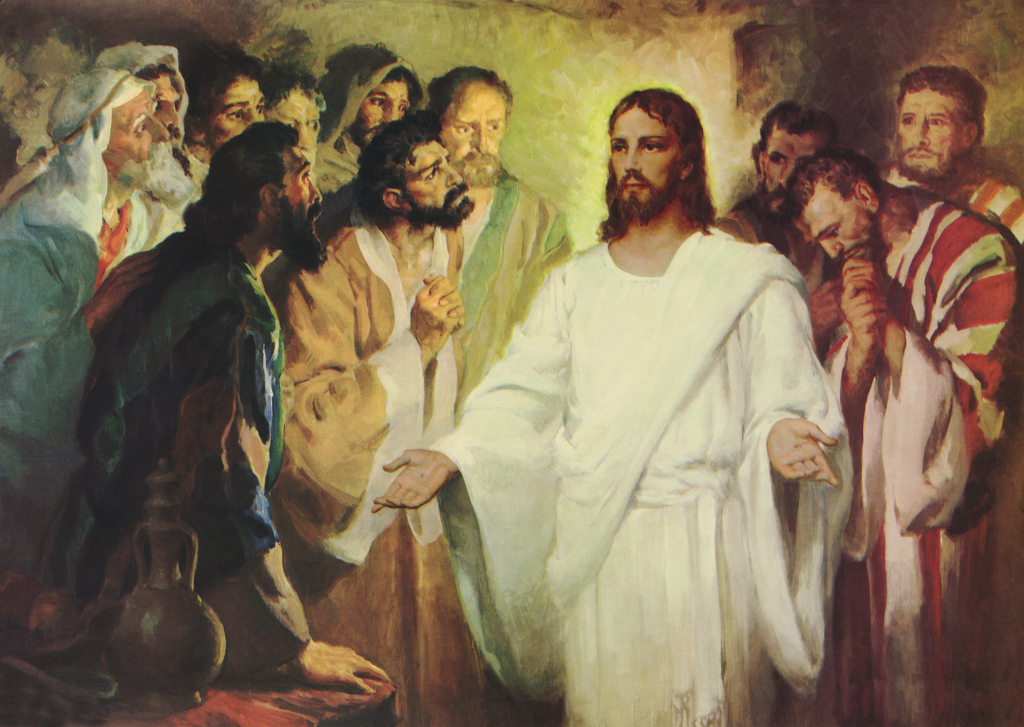Readings: Proverbs 9:1-10 | Ephesians 2:13-22 | Luke 14:15-24
Text: Luke 14:15-24
If it wasn’t true before the pandemic, it is certainly true now: We are a people who are at odds with one another. Family members alienated from one another, friendships strained and breaking from sharp disagreements, and a media culture that would rather erase the memory of a person rather than seek restoration. Even in the church, sadly, people have disagreements and in bitterness refuse to worship together even to the harm of their own soul.

We know that God’s ways are higher than our ways. But today, we have heard about how His way of dealing with conflict and division is higher than ours as well.
Hear again from Ephesians 2 how God works:
13 But now in Christ Jesus you who once were far off have been brought near by the blood of Christ. 14 For he himself is our peace, who has made us both one and has broken down in his flesh the dividing wall of hostility 15 by abolishing the law of commandments expressed in ordinances, that he might create in himself one new man in place of the two, so making peace, 16 and might reconcile us both to God in one body through the cross, thereby killing the hostility. 17 And he came and preached peace to you who were far off and peace to those who were near. 18 For through him we both have access in one Spirit to the Father. 19 So then you are no longer strangers and aliens, but you are fellow citizens with the saints and members of the household of God…
Do you get a sense of the divide? All of you far off, a dividing wall of hostility, commandments and ordinances, strangers and aliens. No doubt we have some experience of that. There are those in our lives who may not live far away but are far off in ideologies. Dividing walls are shored up by the isolation we erect online and who we don’t even call. There are many who are strangers (xenos, from which we get xenophobic) to us—whether by nationality, language, or socio-economic class.
But God was not content to leave the greatest divide intact, the root of all of our divisions and pain: the divide caused by the disharmony between God and His mankind. His ways are not our ways, because His goal is different. He works for peace. Notice how many times that word appears in the Epistle lesson. I suggest you even take a pencil and underline each of the four instances. This is God’s goal: peace.
You may be familiar with the Hebrew word for peace, shalom. What you may not know is the root of this word. It comes from the verb, shaleim, to make complete.[1] We’re accustomed to thinking of peace merely as stillness, an emotional state, a lack of conflict. But God’s goal is not to artificially create calm, but shalom, to make complete and restore what was shattered beyond repair: “For he himself is our peace… one new man in place of the two, so making peace… he came and preached peace to you who were far off and peace to those who were near.” So, when our Lord says to His disciples the evening of His resurrection, “Peace to you,” He is enacting reconciliation, bringing the distant near, destroying the animosity.

In contrast, what we see in the world (and if we’re honest also in our intentions), is a different goal. Rather than peace, the world and our sinful nature seek power. How can we get the upper hand? How can we change the world as we think it should be? The conflicts we see in the world right now are a pursuit of power: “speak truth to power” people demand. While they talk of “diversity, inclusion, and equity” it turns out that they use coercion to force their vision. Rather than reconciliation, they demand and exact reparations, giving themselves the advantage to which they feel entitled. Just ask any teacher, or administrator, or government employee who has dared to oppose a minority’s “personal expression.”
But the way of power is a lie, as old as the Serpent himself who told Eve that she would be “like God, knowing good and evil,” and who “took [Jesus] to a very high mountain and showed him all the kingdoms of the world and their glory. 9 And he said to him, ‘All these I will give you, if you will fall down and worship me.’” (Gen. 3:5; Matt. 4:8-9)
Power is a dead end. Peace is what’s eternal, for peace is from God. And we see this in action in the Gospel lesson. Jesus says these words while he reclines at table on the Sabbath at the house of a ruler of the Pharisees. Earlier in the visit, Jesus put all of them on edge by healing man with dropsy on the Sabbath. After noticing how they arranged themselves at the table, Jesus told the story of the wedding feast, to the effect that, “Everyone who exalts himself will be humbled, and he who humbles himself will be exalted.” (Luke 14:11) One of those in attendance, surely thinking himself a humble and just man said,
“Blessed is everyone who will eat bread in the kingdom of God!” 16 But [Jesus] said to him, “A man once gave a great banquet and invited many.
We think that we have a pretty good handle on God’s ways, but He has a way of shining the light on what’s in human hearts. “The Lord looks down from heaven on the children of man”—of all nations and races, languages and tribes, men and women alike, of all opinions, orientations, philosophies, and He saw: “They have all turned aside; together they have become corrupt; there is none who does good, not even one.” (Ps. 14:2-3)
This parable teaches us about the grace of God, which is meant to win people to salvation not by human power, but by God’s peace—the peace which takes what is broken beyond repair and restores it. The peace which takes a deluded and darked humanity and restores it to perfect and eternal fellowship with Him.

He teaches us this by the image of a banquet and the invitation. That is, how does God accomplish His rescue mission of peace for this shattered world? He does it by a Word of invitation.
17 And at the time for the banquet he sent his servant to say to those who had been invited, ‘Come, for everything is now ready.’ 18 But they all alike began to make excuses. The first said to him, ‘I have bought a field, and I must go out and see it. Please have me excused.’ 19 And another said, ‘I have bought five yoke of oxen, and I go to examine them. Please have me excused.’ 20 And another said, ‘I have married a wife, and therefore I cannot come.’
The Lord looks down from heaven on the children of man—all those far off, his enemies, the strangers—and loves them. His invitation is the Word of God. It tells of God’s work to make peace with His enemies, to raise the dead, to bring near those who are far away, to bind up the injured and destroy the fat and strong. It is not an inert Word, but comes with God’s power. In fact, that is the only power that can reach that goal of peace!
This is what evangelism is. If you need a refresher on the almighty power of God in this area, review Ephesians 1, where it’s clear that none of us contributed to the invitation or accepting it: “he chose us in him before the foundation of the world, that we should be holy and blameless before him. In love 5 he predestined us for adoption to himself as sons through Jesus Christ, according to the purpose of his will” (Eph. 1:4-5)
There’s a guilt that’s all too often attached to evangelism. It comes from the Arminian notion that we have the strength to turn from evil to good, to become turncoats from the devil to be reconciled to God. We’re especially vexed by this in America, because decision theology is the bread and butter of revival movements. It’s appealing because it lets us have some say our eternal destination. It’s more appealing than its opposite, double predestination, which says that both salvation and damnation are in God’s hands, and we’re no more than clay. But Scripture teaches neither of these. Listen to the rest of the parable:
21 So the servant came and reported these things to his master. Then the master of the house became angry and said to his servant, ‘Go out quickly to the streets and lanes of the city, and bring in the poor and crippled and blind and lame.’
22 And the servant said, ‘Sir, what you commanded has been done, and still there is room.’ 23 And the master said to the servant, ‘Go out to the highways and hedges and compel people to come in, that my house may be filled. 24 For I tell you, none of those men who were invited shall taste my banquet.’ ”

mid 17th century
If God were a Calvinist, who taught double predestination, then why should He be angry or surprised at those who refuse the invitation? If God were an Arminian, He would just spread the dragnet further, hoping that He might catch a few more fish; try new flypaper until something sticks. But neither is the case. As Luther beautifully explains about the 2nd Petition: “The Kingdom of God comes by itself without our prayer, but we pray in this petition that it may come to us also.” God is good, and He desires all to be saved and come to a knowledge of the truth (1 Tim. 2:4). He sends out His Word, the preaching of repentance and forgiveness of sins in Jesus’ Name throughout the world—
Their voice goes out through all the earth,
and their words to the end of the world.
In them he has set a tent for the sun,
5 which comes out like a bridegroom leaving his chamber,
and, like a strong man, runs its course with joy.
6 Its rising is from the end of the heavens,
and its circuit to the end of them,
and there is nothing hidden from its heat. (Psalm 19:4-6)
The Gospel is the power of salvation for all who believe. So the Church is entrusted with this living and active Word. Nevertheless, it is not our human effort that will fill the seats at the heavenly banquet; that is God’s work. It’s our old craving to do it by our own might that leads us to pride or despair—pride that our programs could give God a hand, or despair because we see human failure to mathematically reach every person.

But keep the Lord before your eyes, trust in Him who says, “The wind blows where it wishes, and you hear its sound, but you do not know where it comes from or where it goes. So it is with everyone who is born of the Spirit.” (John 3:8) That voice will go out on our lips or others—not to excuse complacency, but to assure us that God is mighty to save the lost.
Yet, also know that there are many who choose to remain on the broad way that leads to destruction. Do not let their unbelief cause you to stumble, so that you flog yourself for not doing something more. If you have shared the invitation with them, that is where the powerful Word of God is. Love your neighbor as yourself, pray for them as your Lord commands, and heed the invitation to the banquet yourself.
Come to the foretaste of that banquet today, you who have heard His voice. And, no doubt, there are people you know who have thus far rejected the invitation—“I have bought a field…I have bought five yoke of oxen…I have married a wife” or a myriad of other excuses. But remember that God has made each of you members of a priesthood. Priests intercede before God, and you priests have access to God’s throne: “For through him we both have access in one Spirit to the Father.” (Eph 2:18) So I would suggest, as you come to the Lord’s table to taste of His banquet, bring a name or names of people you know of whom you are afraid.
Remember the example of those in the Gospel who brought others to Jesus that He might bless them: the paralytic who was healed and forgiven, the daughter freed of demons, the servant released from his affliction (Matt. 8, 9, 15). Those who loved them interceded for them, and Jesus did not fail to have mercy and bring His blessing.
In this way, the Kingdom of God comes among us. He brings those who were far off near by His blood. He removes the dividing wall of hostility. He creates one new man, reconciling and removing the hostility. God will accomplish His work of peace among us, in our age, in our city. He will give the increase and build us together into a dwelling place for God by His Spirit. In the Name + of Jesus. Amen.

[1] שָׁלֵם Francis Brown, Samuel Rolles Driver, and Charles Augustus Briggs, Enhanced Brown-Driver-Briggs Hebrew and English Lexicon (Oxford: Clarendon Press, 1977).
Leave a Reply